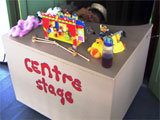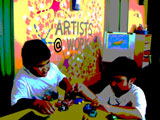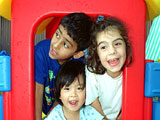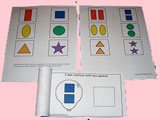Special Needs Programmes
Early Intervention Program
Objective:
To provide toddlers and pre-nursery children with educational skills and adaptive behavioural skills. Children
will learn basic language, literacy and social skills through exploratory play and teacher-supported instructions.
Focus will also be placed on building their cognition, fine motor, gross motor, visual perception, attention and memory.
Area of Focus
 Language and Literacy (including phonics)
Language and Literacy (including phonics)
 Cognition
Cognition
 Social / Adaptation Skills
Social / Adaptation Skills
 Fine-motor Skills
Fine-motor Skills
 Gross-motor Skills
Gross-motor Skills
 Music Appreciation
Music Appreciation
 Arts and Craft
Arts and Craft
 Nature and Science exploration
Nature and Science exploration
 Physical Development (includes physical play and sports)
Physical Development (includes physical play and sports)
Support Activities
 Speech Therapy
Speech Therapy
 Occupational Therapy
Occupational Therapy
 Field Trips
Field Trips
Language & Literacy
Children will learn basic language and literacy through central themes that appeal to them (examples- stories by
popular authors, our community helpers, etc). Children will learn to understand simple instructions and words
when used in context. Children will also be introduced to phonics, letter identification through the Zoo-Phonics
(see separate write-up) system. The primary mode of learning will be through practical and physical activities,
purposeful play, stories, songs and rhymes. Through purposeful play, children experience the thrill of genuine
achievement.
The use of PECS (Picture Exchange Communication Symbols) will be introduced as a means of getting children to
communicate. The program will use innovative equipment (eg computer medium, assistive technologies),
experiential learning and good teaching materials to reinforce the child's interest in the language and trigger
all their senses. This in turn, helps children express themselves in conversation, develop oral skills, which
in turn helps them to use phrases in their daily life. Field trips, where possible, will be arranged to support
the ongoing themes and promote social interaction.
The school has Speech and Language therapists to help children with speech and language delays.
Cognition
Children will learn math and spatial concepts and develop their problem solving skills and visual-motor skills
through various work activities and symbolic play. Through purposeful play, exploration and discovery, children
will use problem solving strategies to find solutions to their assigned tasks. Children also make connections
and see relationships among ideas.
Social / Adaptation Skills
Through warm and nurturing classroom environment, children learn to develop their sense of independence,
self-esteem and confidence. When working in groups, children learn to lead, follow, care, ask for help,
co-operate, organize and make decisions - all useful skills for formal school and later life. Children will
learn to express their feelings in words and gestures, resolve conflicts and work co-operatively. Stories and
themes built around good social skills are also used to reinforce good social behaviour.
Children will also be encouraged to perform daily routines like eating, taking turns, dressing, grooming, using
the toilet, etc.
Fine & Gross Motor Skills
Children develop gross-motor and fine-motor skills through a comprehensive program of outdoor activities, play
and work activities. Gross motor skills are developed through outdoor activities like playground activities,
water play, sand play, bicycles and tricycles and games. Fine-motor skills are developed through activities such
as painting, threading, pegging etc - all designed to improve tactile integration and manipulation, grasping,
releasing and bilateral skills.
Children are seen in occupational therapy to maximize his or her independence in the home, school and community
environments. Our Occupational Therapists are skilled in assessing a child's functional levels in the areas of
fine-motor and gross motor, visual perception, visual motor, self-care/ activities of daily living, feeding and
sensory processing. In addition, Occupational Therapists assess the need for adaptive equipment and technology,
and make the appropriate recommendations.
Music Appreciation
The program will incorporate Music and Movement into the daily activities of the children. Children will be
exposed to various forms of music and musical instruments. Children will learn to express their emotions through
music.
Art and Craft
Art and Craft is an integral part of the Early Intervention program. In addition, Art therapy, an evolving
therapeutic technique, will be incorporated into the Art and Craft curriculum. In Art and Craft, children will
be encouraged to express themselves through art using various medium. Completed artwork will be displayed,
giving each child a sense of pride and accomplishment.
Nature and Science Exploration
Nature and awareness of the environment encourages the children to better appreciate the physical world that we
live in. Nature and science exploration include growing plants, observing insects, walking in the park and nature
trails. Science experimentation will be incorporated to explain concepts as part of the thematic learning.
Regular field trips, designed around the themes for the month, will supplement children's understanding of the
world.
Physical Development
Playground activities, Sand play, Water play, learning to ride bicycles and tricycles have been incorporated
into the curriculum to focus on the children's physical development and the development of gross-motor skills.
Speech and Language Therapy
Speech and Language Therapy (SLT) helps the child realize his or her maximum communicative ability. The Speech
Language Therapist assesses the child's communicative ability and then prioritizes the intervention goals that
best meets the child's needs. Intervention can begin with the child in an individual session, in a group setting
or in consultation with the staff or parents.
Speech and Language therapeutic intervention for the child may cover developing basic communication
(pre-linguistic) skills, verbal comprehension, spoken vocabulary, sentence expansion, articulation, voice and
a more efficient respiratory system. For some children, an alternative and/or augmentative communication(AAC)
system may be introduced such as signing, object/picture communication system or specific AAC devices to enhance
overall communication.
Another important area that SLTs address is the development of appropriate feeding skills and maintenance of
safe swallowing for the child.
Occupational Therapy Services in St Gerard's.
We have our own team of qualified Occupational Therapists who evaluate, specify and treat problems interfering
with functional performance.
Fine Motor Manipulation - Children are taught how to use their hands together, hold small items correctly and
use a pencil and scissors in preparation for school readiness and dressing skills. Handwriting programme is also
conducted.
Perceptual Skills - Uses puzzles and copying designs to help children develop eye-hand coordination and other
perceptual skills that affect functional mobility and home safety.
Sensory Processing - Assists children in developing the perception & use of touch, movement, sight, sound, smell,
the force of gravity and body position to function in their environment.
Sensory Motor - Teaches children how to use their senses to move their bodies through the environment e.g.
postural control, motor planning etc.
Activities of Daily Living - Emphasis on achieving independence in daily living activities such as dressing,
grooming, brushing, bathing, feeding & toileting
Oral Motor Control - Assists children in learning how to use the muscles of the mouth to suck, swallow and chew.
Learning to use a spoon and drinking from a cup is also emphasized.
Behaviour - Works on children who need some sort of sensory input to focus on tasks in classroom and at home.
Also helps children who are hypoactive and hyperactive to achieve optimal arousal state using sensory activities
to perform better in different settings.
Equipment/Seating - Provides children with the necessary equipment to facilitate development (seats, splints,
adaptive spoons, straps for chairs and other specialized equipment). When needed, the environment is also
modified to suit the children's needs, and to enhance their independence where possible.
Field Trips
Field trips are to be carried out as and when needed to support an ongoing theme or as a term end activity.
Field trips help children learn and understand the world in a fun way. Field trips may include visits to
supermarkets, parks, fire stations, the Zoo, the Birdpark, etc.




